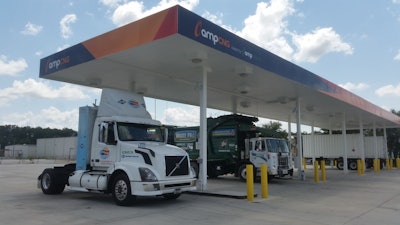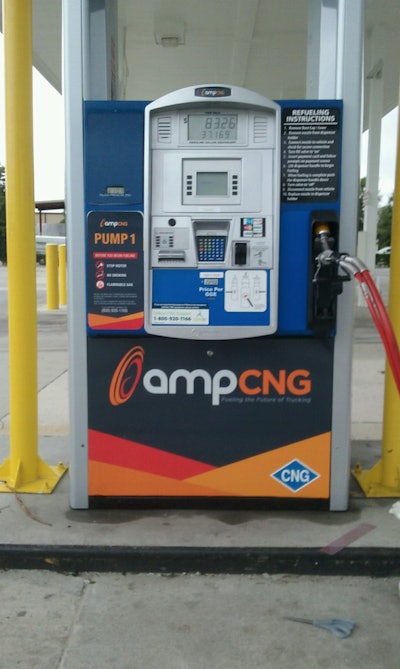
Hard Working Trucks recently caught up with ampCNG CEO Grant Zimmerman who took on various topics, including Cummins Westport’s new ISL G Near Zero natural gas engines, California’s treatment of the natural gas vehicle industry, natural gas vehicle performance and the future of natural gas truck applications.
Besides owning and operating 19 compressed natural gas (CNG) stations across the U.S., Chicago-based ampCNG assists in designing CNG pilot projects to help fleets transition to the cleaner-burning fuel.
For even lower emissions performance, ampCNG also offers fleets renewable natural gas (RNG) which it produces in Indiana from organic waste at its farm-based anaerobic digestion facility, the largest of its kind in the U.S.
 Zimmerman
ZimmermanHWT: How much of an interest are customers taking in RNG vs. CNG?
Zimmerman: RNG is of huge interest to all of our customers. There’s not enough RNG to supply the demand; however, we and others in the industry are working hard to change that and bring on more supply. CNG is of interest primarily in selected markets where diesel prices remain above $2.50 such as California, Oregon, Washington, and several east coast states.
HWT: What are the cost differences between RNG and CNG? What accounts for that difference?
Zimmerman: For fleet customers, there’s actually no cost difference at all.
HWT: Describe any differences in performance characteristics between RNG and CNG.
Zimmerman: There are no performance differences. RNG must meet strict quality specifications determined by the nation’s pipelines. We meet, and generally exceed, the quality specifications that traditional natural gas producers must meet.
HWT: Is there any particular state or states where CNG has proven to be more popular? If so, why?
Zimmerman: CNG is most popular in California due to the high price of diesel fuel. It is also popular in gas producing states as the cost of gas is generally a bit lower and fleets are most comfortable using this abundant clean natural resource.
HWT: CNG is cleaner-burning, so how does that effect oil changes?
Zimmerman: CNG engines use a different type of oil than diesel engines. However, for fleets, the experience and intervals for oil changes are similar to diesel.

Zimmerman: The impact is hard to overstate. One of the big reasons states and cities are so interested in having fleets move away from diesel is due to the smog causing NOx emissions that diesel trucks give off. Diesel trucking is responsible for a massive share of the air quality problems in 153 non-attainment counties across the U.S. Cummins’ NZ engines reduce NOx emissions to levels 10 times lower than the cleanest diesel engines and lower than electric vehicles when you consider the NOx emitted to make power to recharge EV batteries. Southern California, Houston, and other non-attainment areas cannot solve their air quality problems without transitioning diesel trucking to CNG.
HWT: Landi Renzo, which provides alternative fuel solutions for fleets around the world, believes California is favoring electric powertrains to the detriment of the natural gas market. What do you think?
Zimmerman: Unfortunately, this seems to be true. It’s our job in the industry to make sure policy makers and the public understand the role of CNG in cleaning up heavy duty trucking emissions. There’s simply no more effective or efficient solution than CNG trucking for cleaning up mobile smog causing pollution.
HWT: What market looks more promising for CNG development and why? Light, medium or heavy duty?
Zimmerman: Heavy duty. Light and medium duty vehicles can be effectively served with EVs. However, for heavy duty vehicles EVs pose three main issues: First, extremely heavy battery weight limits the amount of cargo that trucks can haul; second, limited range means trucks can work only very short distances before needing to be recharged; third, limited high cost both for batteries and fast charging infrastructure means that electric trucks can cost multiples of similar diesel trucks. Last, there is no commercial electric truck solution out there. Waiting for several years for EV trucks to come to market would allow massive quantities of NOx to continue to spew from diesel trucks, when transitioning to CNG can nearly eliminate diesel NOx emissions today.
HWT: Any concerns about performance differences between diesel and CNG engines?
Zimmerman: No. For like duty cycles, CNG engines possess similar power to diesels.









